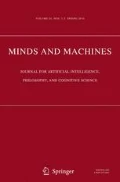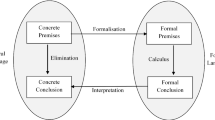Abstract
Turing's (1936) analysis of effective symbolic procedures is a model of conceptual clarity that plays an essential role in the philosophy of mathematics. Yet appeal is often made to the effectiveness of human procedures in other areas of philosophy. This paper addresses the question of whether Turing's analysis can be applied to a broader class of effective human procedures. We use Sieg's (1994) presentation of Turing's Thesis to argue against Cleland's (1995) objections to Turing machines and we evaluate her proposal to understand the effectiveness of procedures in terms of their reliability and precision. A number of conditions for effectiveness are identified and these are used to provide a general argument against the possibility of a Leibnizian decision procedure.
Similar content being viewed by others
References
Church, A. (1936), 'An Unsolvable Problem in Elementary Number Theory', American Journal of Mathematics 58, pp. 345–363.
Cleland, C. (1995), 'Effective Procedures and Computable Functions', Minds and Machines 5, pp. 9–23.
Cleland, C. (2001), 'Recipes, Algorithms, and Programs', Minds and Machines 11(2), pp. 219–237.
Deutsch, D. (1985), 'Quantum Theory, the Church-Turing Principle and the Universal Quantum Computer', Proceedings of the Royal Society of London A. 400, pp 97–117.
Feynman, R. (1982), 'Simulating Physics with Computers', International Journal of Theoretical Physics 21, pp 467–488.
Frege, G. (1879), Begriffsschrift, eine der arithmetischen nachgebildete Formel-sprache des reinen Denkens, Halle: Verlag Louis Nebert.
Gandy, R. (1980), 'Church's Thesis and Principles for Mechanisms', in K. Barwise and Kunen, eds., The Kleene Symposium, North-Holland, pp. 123–148.
Gödel, K. (1934), 'On Undecidable Propositions of Formal Mathematical Systems', Lecture Notes, Princeton. Republished in Gödel (1986), pp. 346–371.
Gödel, K. (1986), Collected Works, Volume 1, Oxford: Oxford University Press.
Hilbert, D. and Ackermann W. (1928), Crundzüge der theoretischen Logik, Berlin: Springer.
Hodges, A. (1983), Alan Turing: The Enigma, Burnett Books Ltd.
Lucas, J. R. (1961), 'Minds, Machines and Gödel', Philosophy 86, pp. 112–127.
Minsky, M. (1967), Computation: Finite and Infinite Machines, Englewood Cliffs: Prentice-Hall.
Penrose, R. (1989), The Emperor's New Mind, Oxford University Press.
Sieg, W. (1994), 'Mechanical Procedures and Mathematical Experience', in A. George, ed., Mathematics and Mind, Chapter 4, Oxford University Press, pp. 71–117.
Turing, A. (1936), 'On Computable Numbers, with an Application to the Entscheidungsproblein', Proceedings of the London Mathematical Society 45, pp. 230–265.
Wittgenstein, L. (1980), Remarks on the Philosophy of Religion, Volume 1, Blackwell.
Author information
Authors and Affiliations
Rights and permissions
About this article
Cite this article
Seligman, J. The Scope of Turing's Analysis of Effective Procedures. Minds and Machines 12, 203–220 (2002). https://doi.org/10.1023/A:1015638814511
Issue Date:
DOI: https://doi.org/10.1023/A:1015638814511




